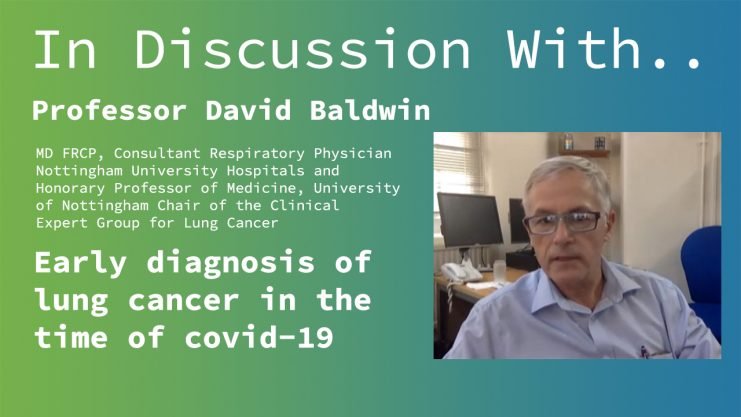Advertisment
Early diagnosis of lung cancer in the time of covid-19

Interview and article by Christine Clark
The lung cancer service has been very seriously affected by the coronavirus pandemic, in particular, lung cancer referrals have fallen sharply during lockdown, says Professor David Baldwin, chairman of the Clinical Expert Group (CEG) on Lung Cancer.
“The issue with lung cancer is that the median survival at diagnosis is just under six months, so, over the lockdown period we will have lost an awful lot of people”, he says.
The current policy drive is to achieve early diagnosis of lung cancer through rapid presentation of patients with symptoms to primary care and rapid referral for investigations and diagnosis. During the early months of the covid pandemic the message was ‘if you have a cough, stay at home’ whereas the message for early lung cancer awareness and diagnosis is just the opposite – ‘if you have a cough for more than three weeks, call your doctor because it could be more something serious’. “More than for any other cancer, these two messages were diametrically opposed and therefore we felt, given the massive reduction in referrals that we had seen, we needed to give some guidance about how we might deal with situation”, says Professor Baldwin. The result was the document, Differentiation of the Cs, that provides guidance on how to differentiate between the coughs of covid-19 and lung cancer.
Should there be a second wave of covid-19, there should be a clearer message for people about how they should think about the possibility of cancer and get in touch with primary care services.
Screening
There is “a lot of work to do to mitigate the damaging effect of the covid pandemic”, says Professor Baldwin. All cancer screening programmes were paused during the covid pandemic but they have now started again. The targeted lung health check programme had just started. Initially this involved 14 pilot sites but now 23 sites are planned. All are functioning again now but there is a backlog to be tackled because of the number of tests not performed during the pandemic. Work is still needed on the awareness and early diagnosis campaign and this could be linked with screening, to emphasise the importance of presenting early if symptoms occur, he explains.
The CEG provides multidisciplinary expert advice on the diagnosis and management of lung cancer and helps to drive improvements in care. One example of this is the National Optimal Lung Cancer Pathway.





